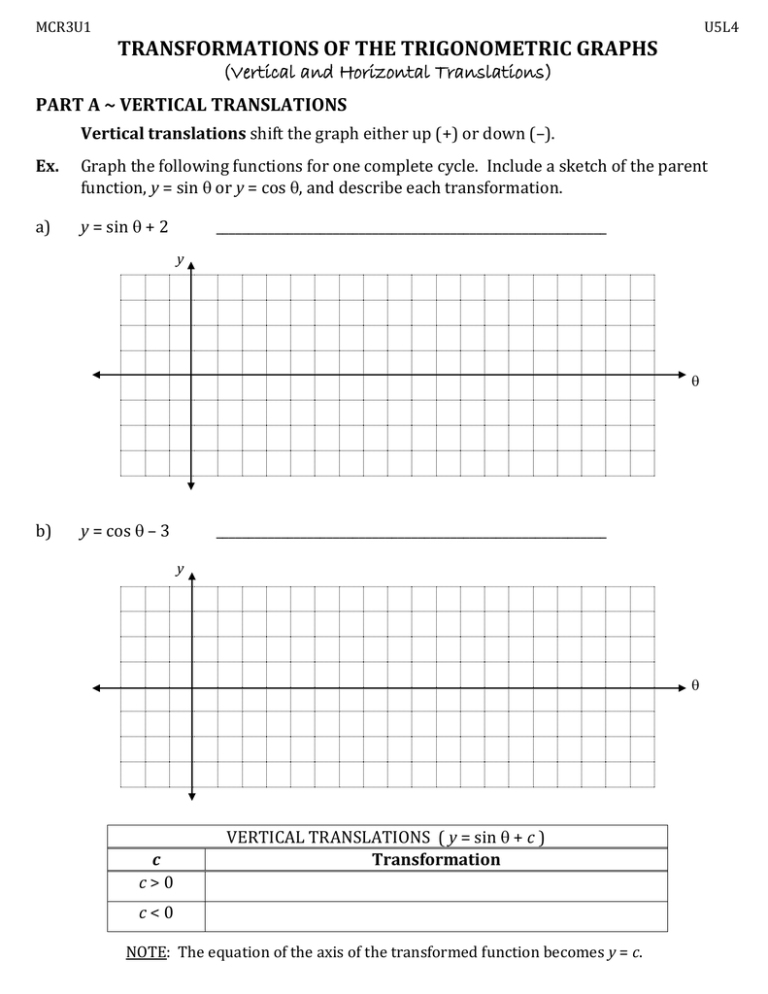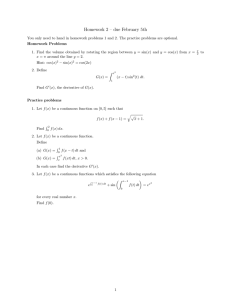TRANSFORMATIONS OF THE TRIGONOMETRIC GRAPHS (Vertical and Horizontal Translations)
advertisement

MCR3U1 U5L4 TRANSFORMATIONS OF THE TRIGONOMETRIC GRAPHS (Vertical and Horizontal Translations) PART A ~ VERTICAL TRANSLATIONS Vertical translations shift the graph either up (+) or down (–). Ex. Graph the following functions for one complete cycle. Include a sketch of the parent function, y = sin or y = cos , and describe each transformation. a) y = sin + 2 ____________________________________________________________ y b) y = cos – 3 ____________________________________________________________ y c c>0 VERTICAL TRANSLATIONS ( y = sin + c ) Transformation c<0 NOTE: The equation of the axis of the transformed function becomes y = c. MCR3U1 U5L4 PART B ~ HORIZONTAL TRANSLATIONS (PHASE SHIFTS) A horizontal translation applied to a trigonometric function is called a phase shift. To describe a phase shift, include the amount and direction of the shift. Phase shifts are either left or right. Ex. Graph the following functions for one complete cycle. Include a sketch of the parent function, y = sin or y = cos , and describe each transformation. a) y = sin ( – 900) ____________________________________________________________ y b) y = cos ( + 600) ____________________________________________________________ y d d>0 d<0 PHASE SHIFTS ( y = sin ( – d) ) Transformation MCR3U1 U5L4 PART C ~ COMBINED EXAMPLES Write an equation and graph one cycle for the following. Include a sketch of the parent function and state the range. sine function phase shift right 450 vertical translation down 2 units y range: _______________________________________________ PART D ~ HOMEWORK 1. p.379 #3 2. Determine the vertical translation and the phase shift of each function with respect to 𝑦 = sin x. Sketch each function. a) c) 3. y = sin x + 3 y = sin (x – 600) + 1 b) d) y = sin (x – 450) y = sin (x + 150) – 4.5 Determine the vertical translation and the phase shift of each function with respect to 𝑦 = cos x. Sketch each function. a) c) ANSWERS: y = cos x – 6 y = cos (x – 300) – 2 b) d) y = cos (x + 300) y = cos (x +900) + 1.5 2.a) VT up 3 units c) VT up 1 unit phase shift right 600 b) phase shift right 450 d) VT down 4.5 units phase shift left 150 3.a) VT down 6 units c) VT down 2 units phase shift right 300 b) phase shift left 300 d) VT up 1.5 units phase shift left 900




